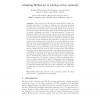Free Online Productivity Tools
i2Speak
i2Symbol
i2OCR
iTex2Img
iWeb2Print
iWeb2Shot
i2Type
iPdf2Split
iPdf2Merge
i2Bopomofo
i2Arabic
i2Style
i2Image
i2PDF
iLatex2Rtf
Sci2ools
131
click to vote
ADHOCNOW
2008
Springer
2008
Springer
Adapting BitTorrent to Wireless Ad Hoc Networks
Abstract. BitTorrent is one of the Internet’s most efficient content distribution protocols. It is known to perform very well over the wired Internet where end-to-end performance is almost guaranteed. However, in wireless ad hoc networks, many constraints appear as the scarcity of resources and their shared nature, which make running BitTorrent with its default configuration not lead to best performances. To these constraints it adds the fact that peers are both routers and end-users and that TCP-performance drops seriously with the number of hops. We show in this work that the neighbor selection mechanism in BitTorrent plays an important role in determining the performance of the protocol when deployed over a wireless ad hoc network. It is no longer efficient to choose and treat with peers independently of their location. A first solution is to limit the scope of the neighborhood. In this case, TCP connections are fast but there is no more diversity of pieces in the network: piece...
ADHOCNOW 2008 | Efficient Content Distribution | Neighbor Selection | Wireless Ad Hoc Networks | Wireless Networks |
Related Content
| Added | 01 Jun 2010 |
| Updated | 01 Jun 2010 |
| Type | Conference |
| Year | 2008 |
| Where | ADHOCNOW |
| Authors | Mohamed Karim Sbai, Chadi Barakat, Jaeyoung Choi, Anwar Al Hamra, Thierry Turletti |
Comments (0)

